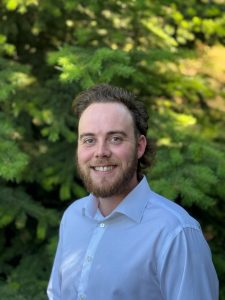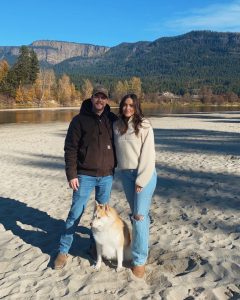Conor Manahan is a civil engineering student originally from Victoria, BC. With a passion for hands-on problem-solving and the outdoors, civil engineering was a natural fit for him. Named as the 2025 Head of Class, he plans to continue working with the District of Lake Country while pursuing his P.Eng designation.

Conor Manahan, Head of Class
Tell us a bit about yourself:
I was born in Victoria, BC, played lacrosse at a high level, and am very passionate about the outdoors. I live in Lake Country now with my wife Cydney, and we both look forward to starting the next chapter of our lives.
What drew you to UBC Okanagan and the School of Engineering?
I’ve always been interested in engineering and am an avid outdoorsman, so being in the Okanagan allowed me to pursue both my passions. We do a lot of camping, and I’m big into hunting and fishing, the wilderness is basically at our doorstep, and we can be out on a forest service road in 15–20 minutes. My dad and brother often come up too, it’s kind of a family thing.
Originally, I started off studying chemical engineering at McGill while playing lacrosse, but at 18 in Montreal, there was maybe a bit more socializing than schooling. I didn’t enjoy it, so I came back home and worked in road construction for a while. My mom, who works for the province, mentioned the civil program, and that got me intrigued. I ended up starting in the civil tech program at Camosun College and eventually bridged to UBC.
What was the most rewarding aspect of your time at UBCO?
The most rewarding aspect of my time at UBCO was seeing that hard work and a good group of friends had tangible outcomes in success. Honestly, I couldn’t have done it alone. Having that crew to push each other and share the load made a huge difference, and seeing that pay off made the whole journey feel worth it.
The most rewarding aspect of my time at UBCO was seeing that hard work and a good group of friends had tangible outcomes in success. Honestly, I couldn’t have done it alone.
What role did community—classmates, mentors, or campus life—play in your journey?
I was fortunate enough to have a close group of friends that all took many of the same classes. We were able to push each other and help each other through the program, and it was critical in all our success. Specifically, in between classes, we’d grab a table at the EME building and just grind through whatever work we had. We’d bounce ideas off each other, challenge each other with questions, and really get into it. That was a huge part of how we kept going, especially with such a heavy workload. A lot of us were transfer students, so we kind of found each other naturally, and it helped ease that “new kid” feeling when jumping in mid-program.
Did you participate in co-op, undergraduate research, or other hands-on experiences? How did they shape your path?
I paved roads in between semesters in my first two years of engineering and was employed as an engineering student from the end of my third year throughout my fourth year. That student role was actually a precursor to my current full-time job with the District of Lake Country. I did a lot of asset management, stayed on part-time during school, and it all rolled into a smooth transition afterward.
The real-world experience from both construction and engineering work helped me connect theory to practice. Things like transportation courses, water conveyance, even project management,those gave me context for what I do day-to-day now. I remember one interview where I brought up the idea of being proactive vs. reactive, which I picked up in a class, and it turned out to be exactly what they were looking for.
There is no doubt that achieving top grades in your graduating class was hard work! Can you talk about a moment when you were really challenged academically—and how you overcame it?
To graduate sooner and accept a full-time employment opportunity, I took 7 courses in my final semester. It was a challenge to balance the workload, but I had a friend doing the same thing and we were able to hold each other accountable and help each other where necessary.
As this year’s Head of Class, can you tell us about a particular project, professor or course that had a lasting impact on you? Why?
I really enjoyed all of Dr. Ahmad Rteil’s classes and his teaching style. His classes were challenging yet rewarding, and his engagement in each lecture was, in my opinion the best way to learn. He didn’t just lecture with slides,he’d open things up for discussion, ask the class for feedback, and walk us through real examples. Like in the concrete course, he’d show a failure and ask us why we thought it failed. It made the content stick. His style of clear, direct feedback was something I really appreciated,it made you accountable but also confident in your progress.
Tell us a bit about your plans after graduation.
I plan to continue my employment with the District of Lake Country, working towards my P.Eng.

Conor and his wife Cydney, with their dog.
How did the Bachelor of Applied Science program prepare you for your current/future work?
The program gave me discipline and a good base of theoretical knowledge to apply to real-world applications. I work in operations and deal primarily with road construction and drainage. Having the theoretical and mathematical background from UBC mixed with construction experience throughout my career has been an invaluable asset. Courses like transportation and water conveyance directly relate to what I do, and even project management taught me organizational skills that I use daily.
How has Engineering changed your view on the world?
Engineering has taught me problem-solving skills. I now view most problems in the world as a puzzle that can be solved through logic and rationale. It’s all about breaking big problems into smaller chunks and chipping away at them piece by piece. That mindset applies to everything,from homework to job challenges.
How do you think the UBCO engineering program prepares students to address global challenges?
I think the biggest thing the UBCO engineering program gives to students is a mental framework and discipline that can be applied to any challenge that we face. Whether it’s coursework or real-world problems, you learn how to structure your approach, break things down, and tackle each part methodically.
I think the biggest thing the UBCO engineering program gives to students is a mental framework and discipline that can be applied to any challenge that we face.
In 5 words or less, how would you sum up the UBCO / School of Engineering experience?
Rewardingly difficult experience.
Looking back, what surprised you the most about your university experience?
When you first enter the engineering program, some of the higher-level classes can seem daunting and unattainable. However, it’s surprising how much knowledge and confidence you gain throughout the course of the program, and classes that once seemed like they would be impossible were within your wheelhouse of understanding by the end.
What advice do you have for future / current engineering students?
Be consistent in both your studies and your career and great things will happen. One thing that worked for me was having a whiteboard in front of my desk with all my tasks on it, numbered by priority. I’d base the order off of both deadline and difficulty, putting the hardest and most urgent tasks at the top. That visual system helped me stay organized. And don’t waste breaks between classes,those were golden for getting work done so I could relax at home later.
Be consistent in both your studies and your career and great things will happen. One thing that worked for me was having a whiteboard in front of my desk with all my tasks on it, numbered by priority. I’d base the order off of both deadline and difficulty, putting the hardest and most urgent tasks at the top.
Anything else you’d like to share about your UBCO Engineering journey?
I’d just say there’s a lot of opportunity in the industry right now. If you’re a student looking for jobs, career fairs are a great way to get started. Talk to people, grab their business cards, and follow up. That little bit of extra initiative can go a long way.
